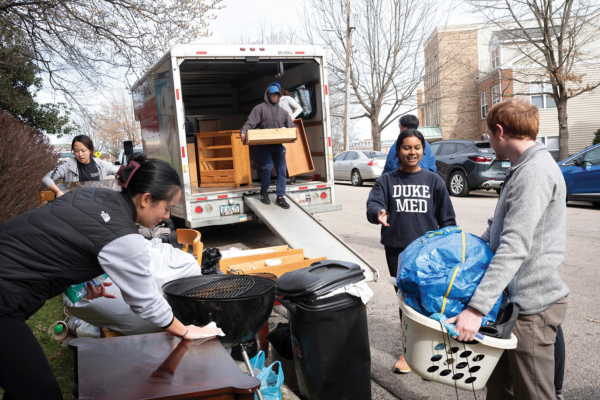
A program led by Duke University School of Medicine students is helping people who have a history of homelessness make the transition to stable housing easier. In the process, the students are gaining a better understanding of the impact housing can have on health.
The WellNest Housing Support Program offers newly housed individuals support on the day of their move and, in some cases, well beyond. The idea for the program came about in 2019 when the Durham County Community Health Assessment identified affordable housing and homelessness as the top community health priorities. Fourth-year medical student Tamar Chukrun and a few fellow students talked with local organizations and discovered an existing gap in supporting unhoused individuals.
“We put resources into helping people find housing,” said Chukrun. “But then when it comes to the move-in, there are not as many resources to help people pack up their belongings, move them, get furniture, and settle into their space. Students could help fill that gap.”
When WellNest officially started in 2020, the program had about 10 volunteers from the School of Medicine. It has since grown to a group of more than 100 volunteers, including graduate, professional, and undergraduate students from across Duke. Durham community members, Duke employees, and students from UNC-Chapel Hill have also volunteered.
WellNest receives referrals mainly from two nonprofit organizations, Durham Homeless Care Transitions and the Community Empowerment Fund.
The students, who call the individuals they help “neighbors,” plan the neighbor’s move, including renting a moving truck, sourcing furniture for the new home through community donations, and recruiting volunteers to help with the move-in.
“People who are experiencing homelessness or are temporarily unhoused come from all kinds of backgrounds,” said Trisha Dalapati, an MD/PhD student and one of WellNest’s founders. “They are truly our neighbors.”
Since spring 2020, WellNest has supported more than 40 Durham and Chapel Hill community members in their moves. The program’s motto is, “Building a community where every neighbor feels at home.”
As future providers, many of the WellNest student volunteers are getting a better perspective of the impact homelessness can have on a patient’s health. They are also learning about the barriers to care that unhoused patients can encounter, such as lack of transportation, which can make it hard to get to medical appointments or pick up prescriptions.
“If there’s black mold in someone’s apartment or a person with diabetes doesn’t have a fridge to store insulin, those are very clear connections between housing and health,” said Maddie Brown, a third-year medical student and a program manager for WellNest.
Story originally published in DukeMed Alumni News, Spring 2024.
Read more from DukeMed Alumni News
More about the WellNest Housing Support Program